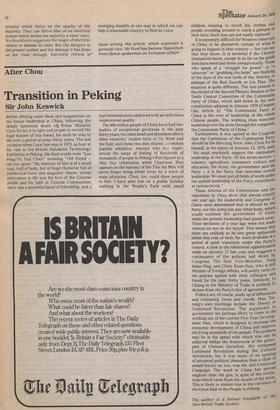After Chou
Transition in Peking
Sir John Keswick
Before offering some ideas and suggestions on the future leadership in China, following the deeply lamented death ofi Prime Minister Chou En-lai, it is right and proper to record the huge stature of this friend, for such he was to me over a period of some thirty years. The last occasion when I saw him was in 1973, as host at his visit to the British Industrial Technology Exhibition in Peking. His final words were "Lao Peng-Yu Tsai Chien" meaning "Old friend — see you again." My memory of him is of a small man, frail of body, but of huge character full of intellectual force and magnetic charm, whose motivation in life was his love of the Chinese people and his faith in Chinese Communism; there was a powerful blend of friendship, and a hard determination endowed with an infectious inspirational quality.
The 800 million people of China have had two leaders of exceptional greatness in the past thirty years, two men head and shoulders above other countries' leaders both in the West and the East, and these two men shared a common popular adulation. Anyone who has experienced the surge of feeling of hundreds of thousands of people in Peking's Red Square at a May Day celebration when Chairman Mao appears on the balcony of the Tien An Men will never forget being swept away by a wave of mass adoration. Chou, too, could draw people to him: I have seen him on a public holiday walking in the People's Park with small Spectator children running to touch his a January r yt h e2a4 , and people crowding around to catch a glimpse of
their hero. Such men are not easily replaced. It is extremely difficult for Western observers of China to be absolutely certain of what ls going to happen in that country — few can saY that they know. It is doubtful if the Chinese themselves know, except in so far as the guide lines have been laid down unequivocally. Those who speak of a "struggle for power" or “a takeover" or "grabbing the helm" are thinking of the days of the war lords of the 'thirties, or
perhaps of the Red Guards or Lin Piao. The situation is quite different. The real pointer is the record of the Second Plenary Session of the Tenth Central Committee of the Communist Party of China, which laid down in the new constitution adopted in January 1975 (Chapter One, Article 2): "The Communist Party of China is the core of leadership of the whole Chinese people. The working class exercises leadership over the state through the vanguard. the Communist Party of China."
Furthermore, it was agreed at the Congress that the Committee of the Communist Party, should be the directing force. Also, Chou En-lai himself, in his report of January 13, 1975, said "We must resolutely support the centralised leadership of the Party. Of the seven sectors — industry, agriculture, commerce, culture and education, the Army, the government and the Party — it is the Party that exercises overall leadership. We must put all fields of work under the unified leadership of the Party committees at various levels."
These Articles of the Constitution and the exposition by Chou show that almost exactlY one year ago the leadership and Congress of China were determined that it should be the Party, not the Army nor any other body, which would continue the government of China when the present leadership had passed away. These decisions of a year ago were not made without an eye on the future. This means that there are unlikely to be any great upheavals either this year or next; far more probable is ,a period of quiet transition under the PartY s control. A look at the ministerial appointments made on January 17 last year also suggests a continuance of the policies laid down by Congress. The first Vice-Minister, Teng Hsiao-Ping, and Chiao Kuan-Hua, who is still Minister of Foreign Affairs, will surely carry on the policies agreed with their colleague and friend for the past thirty years. Similarly, LI Chiang in the Ministry of Trade is unlikely to deviate from the Party's line of agreement. Politics are, of course, made up of differences and contesting views and creeds. Mao Tsetung's own teachings include the Theory Of Continued Revolution. The arguments in government are perhaps likely to come in the working out of the current Five-Year Development Plan, which is designed to increase the economic development of China and improve may lie in the speed with which thisprcoabnle; the living standards of the people. The achieved Within the framework of the principles of Chinese Socialism. We witnessed Continued Revolution during the Cultural Revolution, but it was more of an upsurge of advanced political obsession than a clash of armed forces; so, too, was the anti-Confucian Campaign. The word in China has proved mightier than the gun, in spite of the revolutions which came from the mouth of the latterf. This is likely to remain true in the corridors o the Great Hall of the People in Peking.
the The author is a former President of Sino-British Trade Society.


































 Previous page
Previous page